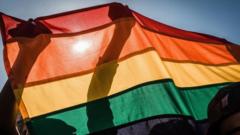With the lifting of the ban, the World Bank emphasizes its confidence in newly introduced "mitigation measures" that are aimed at ensuring that funding does not harm or discriminate against LGBTQ individuals. A spokesperson for the World Bank stated that their mission to combat poverty cannot be fulfilled unless all individuals, regardless of their sexual orientation, can partake in developmental projects. The organization plans to roll out financing for new initiatives in social protection, education, and support for displaced individuals while collaborating with the Ugandan government to enforce anti-discrimination practices.
As one of Uganda's most crucial external financial sources, the World Bank plays a pivotal role in funding infrastructure projects, including road upgrades and access to electricity. However, critics of the World Bank and International Monetary Fund's funding strategies argue that these practices contribute to a cycle of dependency and inhibit sustainable development in poorer nations by enforcing restrictive loan conditions.
The international community condemned Uganda's Anti-Homosexuality Act when it was introduced, with immediate financial implications estimated to range between $470 million and $1.7 billion due to halted financial support. While the Ugandan government defends the law as a reflection of traditional values, critics assert it serves as a deflection from pressing economic issues, such as unemployment and political repression. Human Rights Watch has characterized the new law as a catalyst for violence against LGBTQ individuals, arguing that its provisions create an environment where attacks on perceived sexualities have become more frequent and accepted.
Despite the government's assurances about the legislation, which outlines substantial penalties for promoting LGBTQ issues, advocates warn that it creates an intimidating atmosphere for anyone who advocates for LGBTQ rights. As Uganda finds itself at a crossroads, the implications of these developments resonate not just locally, but throughout the continent, where several African countries are considering similar measures against LGBTQ rights.
As discussions unfold, the international community remains vigilant about the balance between financial assistance and human rights in Uganda, particularly as the nation grapples with the broader implications of its stance on LGBTQ rights.
As one of Uganda's most crucial external financial sources, the World Bank plays a pivotal role in funding infrastructure projects, including road upgrades and access to electricity. However, critics of the World Bank and International Monetary Fund's funding strategies argue that these practices contribute to a cycle of dependency and inhibit sustainable development in poorer nations by enforcing restrictive loan conditions.
The international community condemned Uganda's Anti-Homosexuality Act when it was introduced, with immediate financial implications estimated to range between $470 million and $1.7 billion due to halted financial support. While the Ugandan government defends the law as a reflection of traditional values, critics assert it serves as a deflection from pressing economic issues, such as unemployment and political repression. Human Rights Watch has characterized the new law as a catalyst for violence against LGBTQ individuals, arguing that its provisions create an environment where attacks on perceived sexualities have become more frequent and accepted.
Despite the government's assurances about the legislation, which outlines substantial penalties for promoting LGBTQ issues, advocates warn that it creates an intimidating atmosphere for anyone who advocates for LGBTQ rights. As Uganda finds itself at a crossroads, the implications of these developments resonate not just locally, but throughout the continent, where several African countries are considering similar measures against LGBTQ rights.
As discussions unfold, the international community remains vigilant about the balance between financial assistance and human rights in Uganda, particularly as the nation grapples with the broader implications of its stance on LGBTQ rights.



















